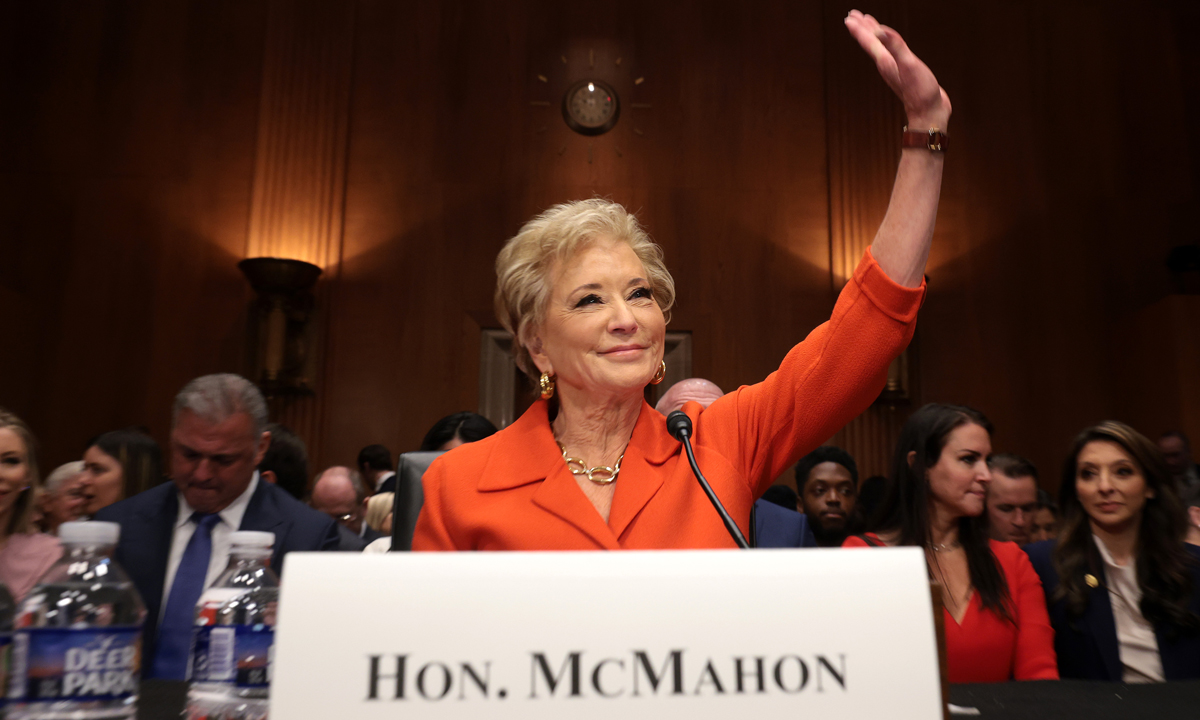If McMahon Really Wants to ‘Invest in Teachers,’ She Should Listen to Them
Stone: Survey of educators show they value the exact programs and initiatives that the new secretary is prepared to cut.

Get stories like this delivered straight to your inbox. Sign up for The 74 Newsletter
A few weeks ago in Washington, D.C., I sat beside several teachers and watched Linda McMahon, President Donald Trump’s new education secretary, testify in front of the Senate. He had already told reporters that “the Department of Education’s a big con job” and he’d “like it to be closed immediately.” He said he wanted McMahon to “put herself out of job” — a comment widely taken to mean he wants her to dissolve the Department of Education. McMahon’s testimony before the Senate that Trump merely wants the department to “operate more efficiently” was difficult to stomach.
But the comment from the hearing that stung the most was McMahon’s promise to “invest in teachers.” I didn’t need to look at the teachers sitting next to me to see their frustration. McMahon has expressed strong alignment with Trump’s education agenda, which promises many things — from diverting public dollars to private schools and micromanaging or outright prohibiting workforce diversity initiatives — though investing in teachers is not one of them. If she is sincerely interested in what teachers need to be successful, she should ask them — which she does not appear to have done.
A new survey of 1,000 teachers conducted by Educators for Excellence, the nonpartisan, teacher-led organization I co-founded in 2011, asked teachers about their values, classroom needs and policy views. It reveals a resounding rejection of the education policies the Trump administration has pursued or enacted in its first weeks in power. From incendiary and legally dubious Executive Orders that meddle directly in classrooms by attempting to interfere in curricular decisionmaking to regulatory changes that strip LGBTQ+ students of federal protection against discrimination, this agenda is not what America’s educators want for their students.
If McMahon were interested in supporting teachers, she’d know that 92% of them favor federal funding for Title I and the Individuals with Disabilities Education Act, which provide crucial aid to help teachers serve low-income students and children with disabilities. If she’d take the time to meet with educators and listen to their perspectives, she’d know that a mere 16% support using public dollars for private schools and that 79% favor collecting student achievement data, which is necessary for building the evidence base on which types of teaching and school leadership work best.
The Trump administration has already shown it is at odds with each of these positions and many others held by the professionals who fill the nation’s classrooms. Its agenda, which McMahon was presumably hand-picked to carry out, not only ignores the will of teachers — it also represents a radical shift away from decades of bipartisan agreement on core pillars of public education.
Twenty-three years ago, President George W. Bush signed into law No Child Left Behind, which expanded the federal government’s role in public education. Although the law was far from perfect, it sought to ensure that our public dollars were having the intended impact and drew on a longstanding bedrock of conservative social policy: accountability. When President Barack Obama refashioned No Child Left Behind into the Every Student Succeeds Act, he maintained the focus on accountability, which Democrats agreed was vital to improving the quality of America’s public schools.
Now, accountability is on the chopping block. Trump has already gutted the nation’s top education research agency, the Institute of Education Sciences, which collects data and reports on how well states are educating students. And, on Feb. 19, a key NAEP assessment was canceled, foreclosing on the collection of longitudinal data that goes back over 50 years. Without reliable information about student achievement and school funding, schools will be left to navigate blind, relying on unproven, lower-quality curricula and tools. This will weaken learning standards and stall academic progress at a time when we should be closing achievement gaps, not widening them.
As with many policy matters, there are political differences on key education issues like school choice, how to best fund schools, and the right measures to hold schools and districts accountable. The same is true among teachers: In hundreds of surveys and countless conversations with educators over the past decade, I’ve encountered wide-ranging views on everything from layoffs, evaluations and school choice to, most recently, artificial intelligence. While 45% of educators nationally think AI shows promise, 50% have concerns. This lack of consensus is what makes teachers’ alignment against Trump’s education agenda all the more striking — though not surprising.
No matter where they live, educators now face the likelihood that crucial funding will be stripped from their classrooms. If Trump cuts Title I funding, for example, Alabama schools will lose an estimated $300 million. Mississippi’s education budget would shrink by 25% if Trump cut the state’s federal funding. It’s no wonder that teachers across the country, whatever their politics happen to be, fiercely oppose the president’s crusade to dismantle a department that exists to strengthen their ability to do their jobs.
America asks a lot of its teachers, whose overall satisfaction has dipped to historic lows. If the nation’s leaders in Washington want them to stay in the classroom and deliver the outstanding education that America’s kids need, the first thing those leaders – and that includes the new education secretary – better do is listen to them.
Get stories like these delivered straight to your inbox. Sign up for The 74 Newsletter

;)
